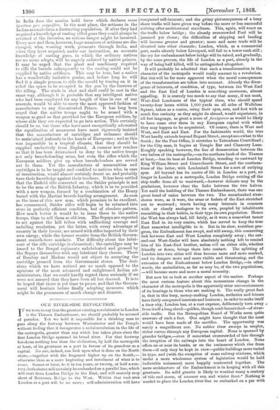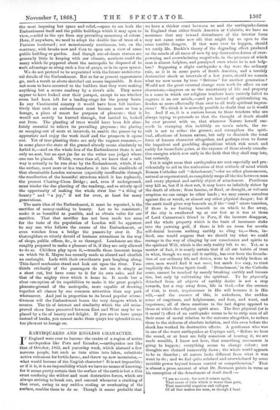OUR 1UVER-SIDE REVOLUTION.
F we were to say that the greatest existing revolutionist in London is the Thames Embankment, we should probably be accused of paradox. Yet we hold it impossible for a thinking man to pass along the footway between Westminster and the Temple without feeling that it inaugurates a social revolution in the life of the metropolis, greater than any which has taken place since the first Loudon Bridge spanned its broad river. For that footway betokens nothing less than the abdication, by half the metropolis at least, of its greatness as a port in favour of its grandeur as a capital. No one, indeed, can look upon what is done on the North shore,—together with the fragment higher up on the South,— otherwise than as a mere beginning and instalment of what is to come. Sooner or later, be it in ten years, or twenty, or half a cen- tury, both shores will certainly be embanked on a parallel line, which will start from London Bridge to the East, and will scarcely stop short of Battersea Bridge to the Willi Within that vast area London as a port will be no more ; self-administration will have conquered self-interest; and the grimy picturesqueness of a busy shore traffic will have given way before the more or less successful striving after architectural stateliness. This, again, will react on the traffic below bridge ; the already overcrowded Pool will be jammed yet closer; the difficulties of shipping and landing will become greater and greater; more and more trade will be diverted into other channels ; London, which, as a commercial port, ranks already below Liverpool, will fall to a lower rank still ; the cry for embankment below bridge will be raised, and gradually, by the same process, the life of London as a port, already in the way of being half killed, will be extinguished altogether.
It will probably be admitted that such a transformation in the character of the metropolis would really amount to a revolution. But this will be far more apparent when the moral consequences of the transformation are taken into account. Already the diver- gence of interests, of condition, of type, between the West End and the East End of London is something enormous, almost appalling. It is scarcely too much to say that many, if not most, West-End Londoners of the typical class, who should spend twenty-four hours within 1,000 yards on all sides of Wellelose Square, taken as a centre, using their eyes, ears, and feet with as much free curiosity as they might do abroad, would experience, in all but language, as great a sense of foreignness as would be likely to have come over them in any European capital with which they may happen to be acquainted. Of course, there is West and West, and East and East. For the fashionable world, the true West hardly extends beyond Regent Street, except somewhat to the South ; for the Post Office, it stretches to Tottenham Court Road ; for the City man, it begins at Temple Bar and Chancery Lane. Roughly speaking however, the line of demarcation between the two halves of the metropolis,—on the northern bank of the Thames at least,—has its base at London Bridge, trending to eastward by King William Street and Gracechurch Street, and the continua- tions of the latter, with Leadenhall Street for a sort of outlying spur. All beyond has its centre of life in London as a port, no longer in London as a metropolis, London Bridge cutting off the ship traffic from all to westward,—however delicate may be the gradations, however close the links between the two halves. Yet until the building of the Thames Embankment, there was one great bond of union between the two. The unembanked river- shores were, as it were, the arms or feelers of the East stretched out to westward ; tracts having many interests in common with or closely analogous to its own, peopled by inhabitants resembling in their habits, in their type its own population. Hence the West has always had, till lately, as it were a somewhat tamer East End in its very centre, which has served to keep the true East somewhat intelligible to it. But in its slow, resistless pro- gress, the Embankment has swept, and will sweep, this connecting link between East and West London completely away ; the out- and-out West-Ender will have absolutely nothing left to remind him of his East-End brother, unless will on either side, whether friendly or fierce, brings them into contact. The splitting of London into two cities will thus become more and more marked, and its dangers more and more visible and threatening, and the extension of the Embankment below London Bridge,—in other words, the assimilation, as far as may be, of the two populations, —will become more and more a moral necessity.
But now let us look at another aspect of the matter. Perhaps the most curious feature about this momentous change in the character of the metropolis is the apparently utter unconsciousness of its bearings in those who are making it. The really great fact is, that in this busy, money-making London, anthetics and leisure have fairly conquered interests and business ; in order to make itself a finer city, London has, at a vast expense, deliberately torn away from itself a long shred—golden, though mad-besmirched—of river- side traffic. But the Metropolitan Board of Works seem quite unaware of such a fact. One might have thought that the most would have been made of the sacrifice. The opportunity was surely a magnificent one. No nobler river sweeps in ampler, richer curves through any European capital. None is spanned by grander bridges,—even if somewhat overcrowded of late through the irruption of the railways into the heart of London. None offers on or near its banks, or on the eminences which rise from them—if only they be kept in view—public buildings more varied in type, and (with the exception of some railway stations, which under a more wholesome system of legislation would be held indictable nuisances) more happily contrasted together. The mere architecture of the Embankment is in keeping with all this greatness. Its solid granite is likely to weather many a century of tide and storm, of summer sun and winter frost. Nothing is needed to place the London river-line so embanked on a par with
the most imposing but space and relief,—space to see both the Embankment itself and the public buildings which it may open to view, —relief to the eye from any prevailing monotony of colour. Here, if anywhere, we need to adopt the double line of trees of a Parisian boulevard ; not monotonously continuous, but, on the contrary, with breaks now and then to open out a view of some public building or garden. And though out-of-doors statues are generally little in keeping with our climate, nowhere could the many which lie peppered about the metropolis be disposed of to such advantage as along such a line of quays, or in its open spaces.
We do not pretend to be acquainted with the future architectu- ral details of the Embankment. But so far as present appearances go, such a result as above sketched out seems impossible. It does saot seem to have occurred to the builders that they were making anything but a secure roadway by a river's side. They never appear to have looked over their parapet, except to see whether -room had been left for a landing-stage for the penny boats. In any Continental country it would have been felt instinc- tively that such an embankment must become more or less a lounge, a place of resort for purposes of pleasure ; that it would not merely be hurried through, but tarried in, looked -out from. The planting of trees would have been felt abso- lutely essential to relieve its prevailing greyness ; the placing -or scooping-out of seats at intervals, to enable the passer-by to -appreciate and enjoy the work itself and, the prospects it opens -out. Yet of tree-planting there are only the vaguest rumours,— in some places the state of the ground already seems absolutely to forbid it,—and on the whole line of the Embankment there is not -only no seat, but no spot (as far as the writer can judge) where -one can be placed. Whilst, worse than all, we know that a rail- -way is actually to be run close by the Embankment, which, if on the surface, must more or less transform it into the similitude of -that abominable London nuisance (especially insufferable through 'the recollection of the beautiful structure which it has replaced), the present Charing-Cross Bridge ; and, even if underground, must hinder the due planting of the roadway, and so utterly spoil the opportunity of making the whole river line "a thing of beauty" and "a joy," if not for ever, at least for many generations.
The main idea of the Embankment, it must be repeated, is the sacrifice of money-making to beauty. Let us be consistent ; make it as beautiful as possible, and so obtain value for our -sacrifice. That that sacrifice has not been made too soon for the taste of the population of London will be apparent -to any one who follows the course of the Embankment, or -even watches from a bridge the passers-by over it. No thoroughfare so utterly devoid of business attractions in the way .of shops, public offices, &c., is so thronged. Londoners are tho- roughly prepared to make a pleasure of it, if they are only allowed -to do so. Children play upon it,--trundle those innocent hoops -on which Sir R. Mayne has recently made so absurd and churlish an onslaught. Lads with their sweethearts pass laughing along. Thin-faced mechanics stand and look out upon the river. Two- ;thirds evidently of the passengers do not use it simply as a short cut, but have come to it for its own sake, and for :that of the mighty river which it hems in. It needs but a -clear conception of its capabilities to make it the great people's pleasure-ground of the metropolis, more capable of drawing together all classes by one common attraction than any park whatsoever. And just in proportion to its broad popular attrac- Etiveness will the Embankment lessen the very dangers which it -creates. The tie of interest and similarity which the old unim- proved shore lines preserved between East and West may be re- placed by a tie of beauty and delight. If you are to have quays instead of banks, you cannot make those quays too splendid to see, -too pleasant to lounge on.































 Previous page
Previous page